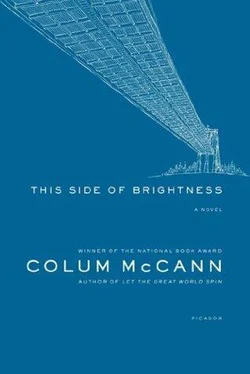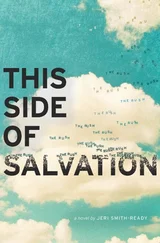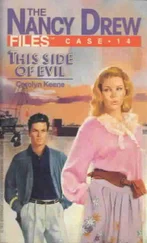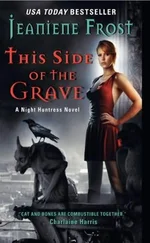That was Papa Love’s first painting — a self-portrait of his heart tied around a sheet of cardboard — and people mistook it for a love heart and gave him his nickname, and he never corrected them.
Once, years ago, a gallery dealer came along the tunnel and woke Papa Love, said he wanted the artist to do some work topside. Papa Love had drawn another self-portrait — as a coffee percolator, the slow downward drip of dark flesh. The gallery owner wanted him to do it on canvas. Papa Love said no and the gallery owner left the tunnel hurriedly, beads of sweat at his brow in the cold, so scared that his legs almost whipped out from underneath him. Dean brushed against the man and palmed the wallet from his pocket. It was the only time that anyone ever saw Papa Love angry. He smashed Dean’s blond head against the wall and went running topside with the gallery man’s wallet. When he came back to the tunnel he was panting, screaming for Dean, but Dean had run off. In revenge Papa Love drew Dean’s portrait under a churchlike series of grills beneath 86th, and he wrote the word PEDOPHILE in giant letters, though later that same day he felt guilty and scrubbed the letters out, left the painting, and Dean took it as a compliment, his portrait on the tunnel wall.
From a distance, Treefrog sees that a huge area of the tunnel wall — directly across from Papa Love’s shack, lit by the fire — has already been primed with white paint, a perfect rectangle outlined in black.
Papa Love steps up to it and stacks four crates on top of each other to use as a ladder. He covers his mouth and nose with a red bandanna, so as not to suck the paint fumes down. An old pair of battered spectacles is placed comically over the bandanna. He stands on the crates and shakes a can of paint. Treefrog can hear the metal marble bouncing inside. Papa Love stretches out his arms and, with sudden violence, sweeps in toward the wall, moving his arms through a giant arc.
A mist of air issues from the top of the bandanna as he steps off the crates — they begin to collapse like a house of cards — and his body travels through the darkness as if on a rope, and the paint strikes the wall as the artist travels, a big half-circular sweep; and then, almost as quickly, Papa Love is on the ground by the campfire, rubbing at his knees with the pain of having hit the tunnel floor.
He steps back, nods at the wall, and begins to restack the crates. Standing up on the curious ladder once again, Papa Love falls in toward the wall and, in another perfect arc, sprays over the half circle a second time. His gray hair swings as he flies. The paint covers every inch of the first sweep. He lands by the campfire and then rubs his hands vigorously against the cold. He spreads the crates out, stands wide-footed — he could be the ghost of Nathan Walker; he could be digging — takes another can of paint, and jets two moons underneath the half circle. Each time he steps back he warms his fingers over the fire.
Treefrog drops down from the catwalk and moves further up the tunnel, stands in the shadows, watching.
Papa Love bends and draws a long straight tube emerging from the half circle. A series of striations are drawn across the tube. The center of the mural is sprayed yellow and then tinged at the edges with a cloud of red. Papa Love works furiously, the cans scattered around him on the ground. He stops every few minutes to ignite his hands with campfire warmth, then stepping upward, haunts the wall with colors using long sweeps of his arm, zeroing in afterward to draw lines emerging from the top of the circle.
The portrait on the tunnel wall grows and a giant lightbulb appears, ten feet high. Papa Love stands by the fire and works at the nozzle of a spray can with his knife. In the high center of the lightbulb he draws two furred lines and, underneath them, ovals tinged with blue. Treefrog realizes that the old artist has drawn a pair of eyes within the lightbulb.
Papa Love uses a paintbrush to draw circuit boards for pupils. Using only one crate now, a long swatch of nose appears beneath the eyes and then a mouth set into half a grin. Some stubble is drawn at the bottom of the bulb.
Papa Love steps back and admires his work, hands in his dungarees.
“Heyyo,” says Treefrog, stepping forward.
“You go to the funeral?”
“Yeah, we got paid. Faraday’s father gave me fifteen bucks to stay away. Rest of them got twenty.”
“Bullshit.”
“First funeral I ever got paid for.”
“I’m too old for funerals now,” says Papa Love.
Treefrog points at the mural. “It’s Faraday, huh?”
“Gonna be. Maybe. Ain’t fully finished yet.”
“He’s looking good.”
“A brother in the spine,” says Papa Love.
Treefrog shuffles in the gravel. “There’s a grave inside all of us.” And then he is embarrassed by what he has said, and he mumbles, “You think it’s ever gonna stop snowing?”
Papa Love shrugs.
“You think Faraday did it on purpose?” asks Treefrog.
“I doubt it. But at least he went the way he probably would’ve liked. I mean, that’s what he probably wanted.”
“Hey,” says Treefrog. “If you were to draw a picture of me, what’d you draw?”
“Man, I only draw dead people.”
“You drew yourself. And Dean.”
“Dead people and people I want dead.”
“Oh.” Treefrog pauses for a long time. “Say, what about Miriam Makeba?”
“I been wishing she was dead too,” says Papa Love.
“Why’s that?”
“So she could come on down here and join me.”
Treefrog laughs.
Papa Love turns to his mural. “You like it?” he asks.
“Yeah, man, ’course I like it. Old Faraday, man. Damn. Hate to see him go.”
“Brother’s in the blood.”
Papa Love shakes another can of paint.
“You seen that Angela girl yet?” asks Treefrog.
“Yeah,” says Papa Love. “Sister’s living with Elijah.”
“Man, you should draw her.”
“Last time I saw her, seemed like she was breathing pretty good.”
“Yeah, but you should draw her anyway,” says Treefrog.
He slaps Papa Love on the shoulder as the old man sets to work on Faraday’s chin.
* * *
In his notebook Treefrog writes, Back down under the earth where you belong. Back down under the earth where you belong. Each letter is like a perfect mirror of the one that has gone before, his handwriting tiny and crisp and replicate. He could make a map of those words, beginning at the B and ending at the g — where all beginning begins and ends — and they would make the strangest of upground and belowground topographies. And then he writes: Angela. Two A’s, one at each end. Nice, that. A good name. Lovely. An elaborate pencil mark at the end, a tail fin.
A massive blue Buick with an exaggerated tail fin cruises the neighborhood. The driver hangs his arm out the left-hand side window, an open bottle of whiskey held at his crotch. He wears sunglasses and a shirt patterned with playing cards, open at the neck to the jack of clubs. In his breast pocket a small bag of marijuana dents the cloth.
Hoofer McAuliffe steers with his knees, one hand tapping the dashboard and the fingers of the other drumming on the outside panel of the door. As he drives, he leans out the window to look at his brand-new set of whitewall tires, almost hypnotizing himself with their swirl. He takes his hand from the dashboard to grab the whiskey bottle and drinks long and deep. Whiskey streams down his chin, dribbling in the stubble. The car travels slowly, twenty-five miles an hour.
On the street’s far corner, McAuliffe notices some boys out playing with a fire hydrant. Huge jets of water stream across the road. The boys are laughing as they soak each passing vehicle, and one of the kids is pointing at McAuliffe’s car. The boys punch each other with delight, the fists sliding off one another’s wet shoulders.
Читать дальше












